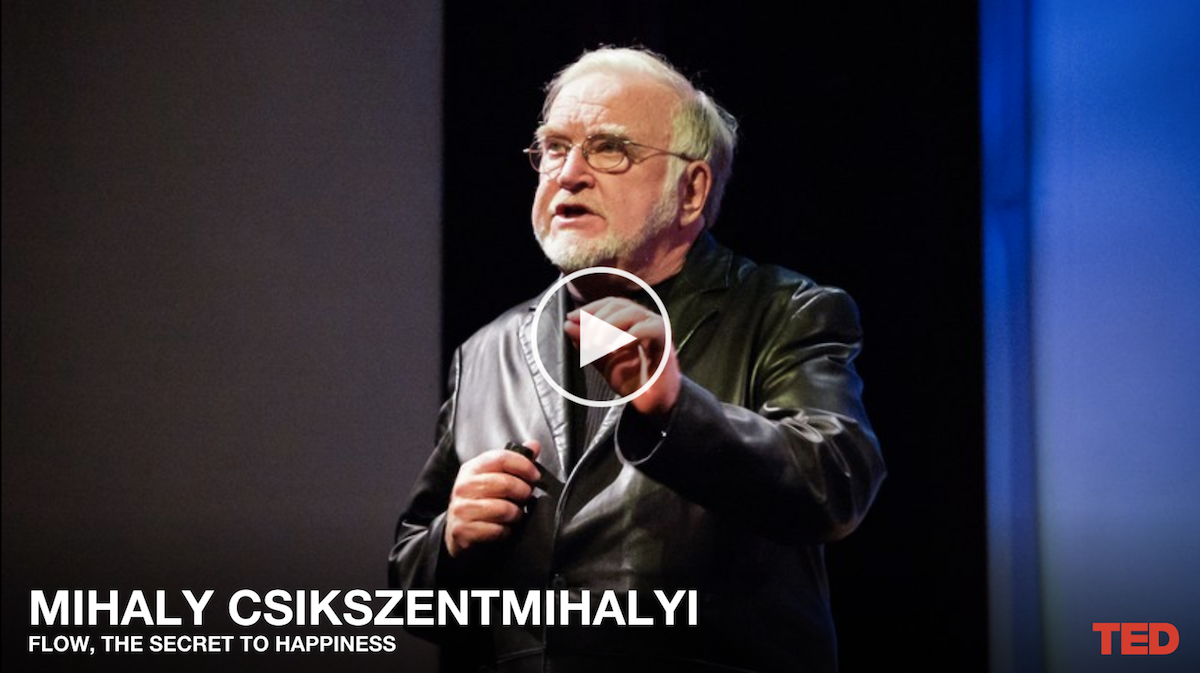I think – or at least I hope – that most people have experienced the feeling of being so deeply engaged in something they love doing that everything else seems to disappear. Maybe you start reading a book, or writing something, or playing a musical instrument, and suddenly hours have gone by before you know it.
Ever wonder what causes you to reach such a state? I recommend the video below from psychologist Mihaly Czikszentmihalyi’s TED talk on “flow” – the state of mind we enter when we are fully engaged in an activity we find intrinsically rewarding. It runs a little under 20 minutes long and is well worth viewing. (Click through to the post if you don’t see the video below.) Or, if your time is limited, skip down to the 7 Key Signs of “Flow” below.
From the video, here’s a poet’s description of what the experience of “flow” feels like:
It’s like opening a door that’s floating in the middle of nowhere and all you have to do is go and turn the handle and open it and let yourself sink into it. You can’t particularly force yourself through it. You just have to float. If there’s any gravitational pull, it’s from the outside world trying to keep you back from the door.
7 Key Signs of “Flow”
Czikszentmihalyi has done years of research on what leads to this sort of state and how it feels. Here are seven key characteristics of “flow” that he enumerates in the video:
- Completely involved in what we are doing – focused, concentrated
- A sense of ecstasy – of being outside everyday reality
- A great inner clarity – knowing what needs to be done, and how well we are doing it
- Knowing that the activity is doable – that our skills are adequate to the task
- A sense of serenity – no worries about oneself, and a feeling of growing beyond the boundaries of ego
- Timelessness – thoroughly focused on the present. Hours seem to pass by in minutes
- Intrinsic motivation –whatever produces flow becomes its own reward.
Not surprisingly, learning is often the key to achieving “flow.” When we are “aroused” to meet a challenge, we feel compelled to acquire the necessary knowledge, practice the necessary skills. To seek flow is to continually engage in learning. For me, this happens most often when I can cut through other distractions and really concentrate on writing.
How about you? I welcome any insights or experiences you are willing to share about your efforts to achieve “flow.”
Jeff Cobb
Mission to Learn






thanks for putting in clear terms what we do every day
Mike – Thanks for commenting. I’ve just glanced at your series so far, but I can tell it is going to be worth reading. I encourage readers here to have a look. And thanks for mentioning Leo’s tweet – very nice of him to do that! – Jeff
I could never claim to get it like the guy who coined the term, but I wrote up a 2-part series of Flow earlier this year (actually I wrote it in 2002 or so for Black Belt magazine but it never made it in, so I re-purposed/tweaked for my new blog – it’s great that Flow has really taken hold as something worth pursuing!)
https://www.refocuser.com/2009/03/introduction-to-the-flow-state-part-1-of-2/
Thanks to Leo’s retweet I found ya!
Taruna – Thanks for commenting. I enjoyed reading your post. Wholeheartedly agree that “flow” factors are great to have in mind when designing/facilitating effective learning experiences! – Jeff
Thanks for this article Jeff. After your blog, I studied this concept a little further and tried to identify how as a learning consultant, I can apply the factors that lead to flow as prescribed by Csíkszentmihályi. I find myself educated and motivated and captured some of my thoughts on my blog – https://tarunagoel.blogspot.com/2009/08/state-of-flow.html